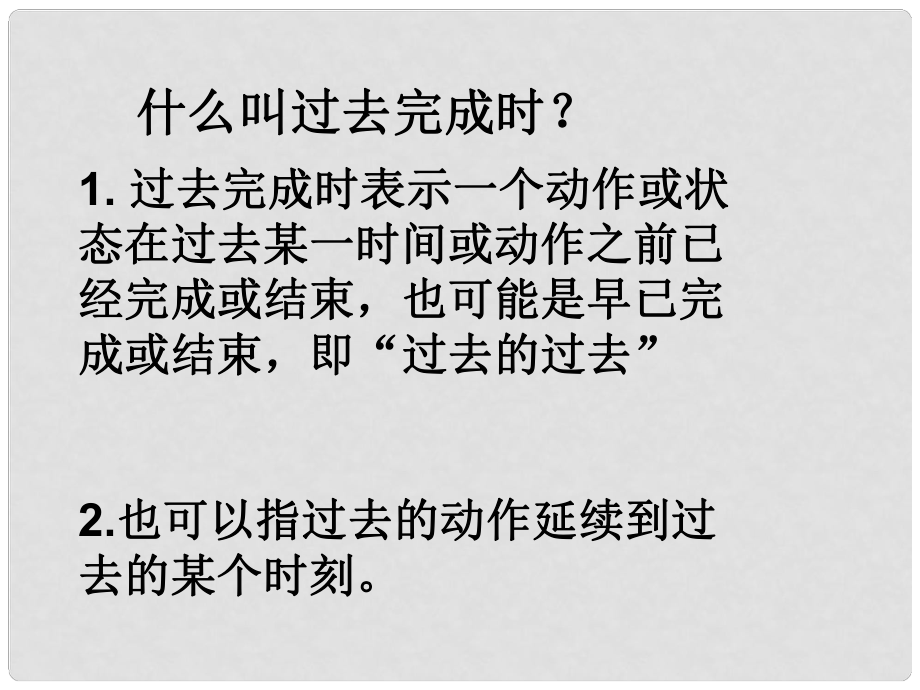《北京市竇店中學(xué)初中英語(yǔ) 過(guò)去完成時(shí)課件 人教新目標(biāo)版》由會(huì)員分享�����,可在線閱讀���,更多相關(guān)《北京市竇店中學(xué)初中英語(yǔ) 過(guò)去完成時(shí)課件 人教新目標(biāo)版(6頁(yè)珍藏版)》請(qǐng)?jiān)谘b配圖網(wǎng)上搜索�����。
1���、 什么叫過(guò)去完成時(shí)���?什么叫過(guò)去完成時(shí)? 1. 過(guò)去完成時(shí)表示一個(gè)動(dòng)作或狀過(guò)去完成時(shí)表示一個(gè)動(dòng)作或狀態(tài)在過(guò)去某一時(shí)間或動(dòng)作之前已態(tài)在過(guò)去某一時(shí)間或動(dòng)作之前已經(jīng)完成或結(jié)束�,也可能是早已完經(jīng)完成或結(jié)束,也可能是早已完成或結(jié)束�����,即成或結(jié)束�,即“過(guò)去的過(guò)去過(guò)去的過(guò)去”2.也可以指過(guò)去的動(dòng)作延續(xù)到過(guò)也可以指過(guò)去的動(dòng)作延續(xù)到過(guò)去的某個(gè)時(shí)刻��。去的某個(gè)時(shí)刻�����。 它是怎樣構(gòu)成的��?它是怎樣構(gòu)成的��? had +動(dòng)詞的過(guò)去分詞動(dòng)詞的過(guò)去分詞 過(guò)去完成時(shí)有哪些用法�?過(guò)去完成時(shí)有哪些用法?a.在在told, said, knew, heard, thought等動(dòng)詞后的賓語(yǔ)從句����。等動(dòng)詞后的賓語(yǔ)從句����。 She said (th
2�����、at) she had never been to Paris.b. 狀語(yǔ)從句狀語(yǔ)從句 在過(guò)去不同時(shí)間發(fā)生的兩個(gè)在過(guò)去不同時(shí)間發(fā)生的兩個(gè)動(dòng)作中���,發(fā)生在先����,用過(guò)去完成時(shí)�����;動(dòng)作中����,發(fā)生在先,用過(guò)去完成時(shí)�����;發(fā)生在后����,用一般過(guò)去時(shí)���。發(fā)生在后,用一般過(guò)去時(shí)�����。 When the police arrived, the thieves had run away.c. 表示意向的動(dòng)詞�,如表示意向的動(dòng)詞,如hope, wish, expect, think, intend, mean, suppose等���,用過(guò)去完成時(shí)表示等,用過(guò)去完成時(shí)表示“原本原本�,未能,未能” We had hoped that you would come, but you didnt.3)過(guò)去完成時(shí)的時(shí)間狀語(yǔ)過(guò)去完成時(shí)的時(shí)間狀語(yǔ) He said that he had learned some English before. By the time he was twelve, Edison had began to make a living by himself.Tom was disappointed that most of the guests had left when he arrived at the party.
 北京市竇店中學(xué)初中英語(yǔ) 過(guò)去完成時(shí)課件 人教新目標(biāo)版
北京市竇店中學(xué)初中英語(yǔ) 過(guò)去完成時(shí)課件 人教新目標(biāo)版

